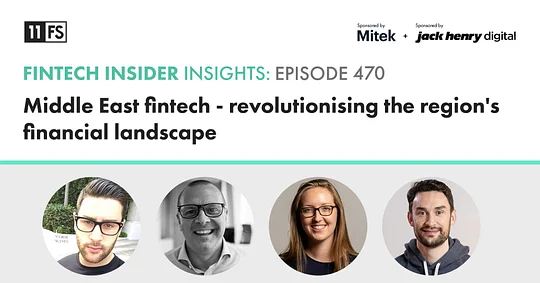Why the Middle East could be the next fintech hotspot

Back at the end of 2019, we dived into the perfect fintech storm that was brewing in the Middle East. Diversification had already started in the region, but financial inclusion was reluctant to follow.
So where are we now?
It’s 2020, and things have been hotting up in the region with opportunities continuing to surface. But what does the region hold for fintech and why is the Middle East where the real gold lies?
A promising year for fintech
This year, the Middle East and North Africa (MENA) has seen an influx of fintech start-ups, new funding and increasing support for existing and new ventures in the Gulf region.
Their fintech sector is growing rapidly and sustainably at a compounded annual growth rate of 30%, and we’re expecting to see $2 billion in VC funding by the end of 2020 😱
Here are some of the highlights:
- Saudi Arabia and the UAE are working on a regional cryptocurrency solution that was agreed in 2019.
- Israel has set targets to implement an Open Banking directive by March 2021.
Uber’s acquisition of Dubai-based ride hailing app Careem suggests the outside world is starting to catch on to the innovation in MENA.
Digital is taking off 🚀
Thanks to a growing need for inclusion and accessibility, the Middle East is slowly but surely going digital.
A study from Deloitte in March 2020 found that 82% of people in the region are willing to start using fintech solutions. And 61% of these are motivated to use technology that directly addresses their banking needs.
This is driven by the convenience and ease of use offered by digital services, highlighting the need for solutions that are built around customer problems (we call this ‘Jobs to be Done’ - learn more in this quick video.)
In May this year, The Gulf Cooperation Council (GCC) Region predicted an increased interest in fintech platforms - particularly digital payments apps - due to COVID-19 (more on this later.)
And fintechs in the area have been reaping the benefits of the lockdown restrictions and bank branch closures. Perhaps unsurprisingly, Bahrain’s digital wallet BenefitPay saw a 1257% growth in the number of remittance payments through its Fawri+ platform in March alone.
Thanks to a growing need for inclusion and accessibility, the Middle East is slowly but surely going digital.
The innovation hot spots 🧨
KSA (Kingdom of Saudi Arabia)
This year, KSA has been pushing forward with its Vision 2030 framework in a bid to drive fintech growth in the region.
This seems to be paying off; the Saudi Arabian Monetary Authority (SAMA) announced in April 2020 that nine more fintechs would join its sandbox, taking the total to 30.
There have also been strong signs of outside interest in the nation's fintech hub, with the UK and the KSA collaborating on the recent UK-KSA Virtual Fintech event.
UAE
Dubai’s financial hub, The International Financial Centre (DIFC), recently announced massive investment in some of the most innovative companies in Dubai.
DIFC saw a 25% increase in new companies registering in the first half of 2020, making Dubai home to more than 50% of fintech companies in MENA.
Bahrain
And let’s not forget about progress in Bahrain. The self-confessed “beating heart of MENA's FinTech scene”, Bahrain FinTech Bay represents the area’s most dynamic and diverse fintech network.
In December last year, the country launched their first Open Banking product. Bahrain FinTech Bay also announced a partnership with Visa, in the hope of developing the sector through educational initiatives, venture acceleration and corporate incubation.
New kids on the block 🐣
It’s not just the big banks and the governments taking initiative when it comes to making fintech fly in MENA. From buy now pay later to investment advisory platforms, a handful of start-ups are making serious moves in the region.
Tabby
Founded in the UAE last year, Tabby is the region’s first buy now pay later ecommerce offering.
Their potential is starting to shine - in June this year, they raised $7 Million to fund their growth and secure their launch in Saudi Arabia.
According to Visa, the UAE remains a hub for ecommerce growth, and Middle East nations are ahead of more mature ecommerce markets (like the US) in terms of internet penetration.
This presents an opportunity to create more convenient ways for customers to shop online, and to open up ecommerce to a broader demographic. For example, people on lower incomes or who struggle to access credit might be the ideal target market for this kind of offering.
Sarwa
Sarwa was elected by the Dubai International Financial Centre (DIFC) to receive investment for being one of the most innovative companies in the region.
So far, they’ve raised an impressive $9.9 million in funding. 👏
An investment advisory platform that helps customers make their money work for them, Sarwa wants to help people ‘build a better future with expert, affordable and easy investing.’
It starts by establishing your financial goals and risk appetite. Then, it creates an investing plan that meets your risk tolerance and time horizon. Features such as portfolio rebalancing, auto depositing and human advisors help Sarwa to strike the balance of automating investing with a human touch.
Consequences of COVID-19 😷
Coronavirus has disrupted virtually every industry in every country around the world. Its destructive path has left almost nothing untouched.
But whether it’s despite or because of the challenges the global pandemic has brought, fintech in the Middle East has shown no signs of slowing this year.
In fact, Bahrain was ranked among the global list of the top 100 start-up hubs earlier this year, thanks to its collaborative start-up community and proper legal framework.
The way customers are choosing to manage their finances has changed dramatically - possibly irreversibly. There’s been a huge uplift in digital payments, a decrease in branch openings and a surge in fintech usage.
As we mentioned in our last blog, cash was king in many parts of the region. But it looks like COVID has put a stop to this. According to this survey from April, nearly two thirds have cut back on cash usage since the outbreak.
Investment in new innovation hubs is also increasing in momentum. The Qatar Fintech Hub (QFTH), co-founded by Qatar Development Bank (QDB),recently expressed plans to encourage and support multinational fintech firms to establish operations in Qatar. This comes at a time when Qatar’s fintech adoption is on the rise.
The way customers are choosing to manage their finances has changed dramatically - possibly irreversibly.
What does this mean for your business?
11:FS has ample experience in the Middle East. We understand the components needed to help accelerate fintech growth and to bring real change to customers across the region.
Our emphasis on cultural research compliments our experience in customer insight, gained through our world-class Jobs to be Done work. This sits as a core pillar in informing our partnerships in the region.
2021 will be a big year for 11:FS in the Middle East. There’s gold to be found at the end of the fintech rainbow, and we can help you find it 🌈

Hungry for more? Tune into the Fintech Insider podcast to hear from some of the people at the forefront of the fintech uprising in the land where cash is king.



